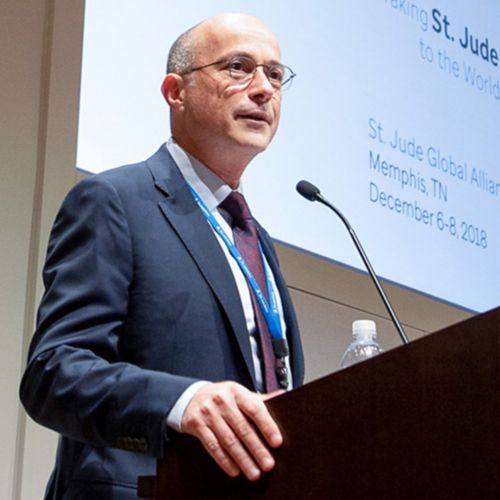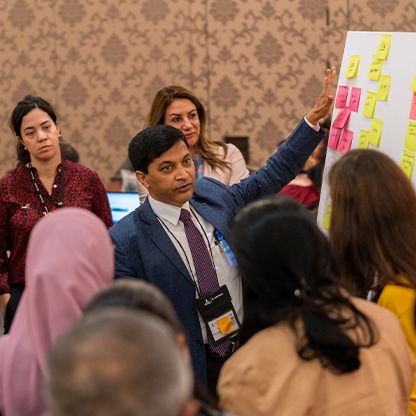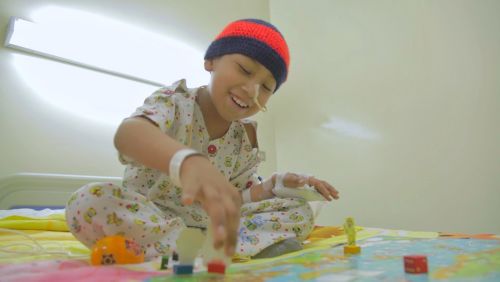St. Jude Family of Websites
Explore our cutting edge research, world-class patient care, career opportunities and more.
St. Jude Children's Research Hospital Home

- Fundraising
St. Jude Family of Websites
Explore our cutting edge research, world-class patient care, career opportunities and more.
St. Jude Children's Research Hospital Home

- Fundraising
Global Scholars: Yuliya Nogovitsyna
Other Global Scholars Projects:
Nogovitsyna: Becoming a Driver of Change
In the summer of 2021, as it came time to identify a topic for her Scholars Project, Yuliya Nogovitsyna remembers receiving some helpful advice.
“What are you dreaming about?” she recalls Global Scholars Program director Shaloo Puri asking her and her classmates during one session. “What are you passionate about? Just don’t think now about publications, academic results. What are you passionate about?”
For Yuliya, that was a fitting place to start.
She is, after all, a former international lawyer whose personal passions first led her to the medical field as a volunteer helping severely ill children at a local hospital. Yuliya eventually made the move full-time, leaving her role as a senior tax manager to become a champion for children with cancer. She now serves as a program director for Tabletochki, a nongovernmental organization dedicated to helping and advocating for pediatric cancer patients in her native Ukraine.
So let’s start with passion. For Yuliya, the subject led her in one direction.
“I decided that, yes, if I’m on this project for several years, I want it to be something which I’m really passionate about,” she says. “And I know that I’m passionate about training and education and development — like, personal development, professional development.”
Yuliya herself holds four master’s degrees and a PhD in international public law. That passion for self-development and education drove her to address a development gap she’d seen in her native country: post-diploma training for pediatric oncologists and hematologists and other related professions.

"I came out of this experience, like, truly a more data-driven and evidence-based person. I’m less now governed by emotions when I make decisions . . . You have to have these facts and numbers. You can add emotions on top of that . . ."
Her project, which has also received support from a My Child Matters grant, is titled the “Knowledge and Competency-based Training for Pediatric Hematology-Oncology Workforce,” or “Know-HOW.” It selects 10 young healthcare professionals from different hospitals and specialties. These individuals are offered a two-year curriculum that includes short-term observerships; attendance at international conferences; and courses in pediatric hematology-oncology, research methodologies, communication skills, and the English language.
As in the Global Scholars Program, Yuliya plans to select a new 10-person cohort each year.
“I’m happy about this project,” she says. “My idea even [is] not to teach them but push them to move forward. Never to stop. We just want to open a window — to give them an opportunity to see the perspectives, to meet other people, to extend their network, to understand that it’s better to work in partnerships than in silos. So just expose them to a different experience than they had before. … I want them to become the drivers of change.”
Yuliya’s own journey to become a driver of change was born from personal heartache. In 2006, she suffered a miscarriage and was told she would likely not be able to have children.
“It took me half a year to just somehow settle with this idea in my mind, and I decided just to refocus my attention,” she says. “If I don’t have my own child or children, I will probably have to give to somebody else all this unrealized motherhood.”
By chance, she says, she happened to read an article in a newspaper about a girl with neuroblastoma, whose tumor was affecting her eye. Yuliya began to make donations but wanted to do more. “I understood,” she says, “that it’s not enough, that money is not enough because I’m not involved personally.”
So she connected with a volunteer who was running art therapy lessons for a local pediatric oncology department. She joined the group for several lessons, then eventually branched out to bring the lessons to another hospital.
It became her new Saturday routine. Even in weeks when she was working outside of the country, she would travel back for those Saturday lessons. “You cannot just betray those children who are waiting for you,” she says.
Yuliya would continue leading those lessons until 2012, when she handed them off to other volunteers because she was due to deliver the first of her two daughters.
As a new mother, she continued to volunteer in other ways, leveraging her expertise in medical terminology to help patients who needed to travel from Ukraine to Italy for stem cell transplants. Eventually, she realized, she wanted to make her volunteering efforts her full-time work — a decision that led her to Tabletochki.
“Not a single day I regretted my decision,” she says.
As the largest charitable foundation for childhood cancer in Ukraine, Tabletochki does everything from providing medical supplies to hospitals and aiding renovations of hospital facilities to training doctors and nurses, supporting families, and providing psychological counseling. In partnership with St. Jude Global and other organizations, Tabletochki was also heavily involved in the ongoing effort to evacuate childhood cancer patients after Russia invaded Ukraine in February 2022, SAFER Ukraine.
During the first year of the war, Yuliya took two months off from the Global Scholars Program. “One reason was that it was physically not possible, just working in such a regime when you have only four hours of sleep every day. My arms were trembling; I just couldn’t even type because of exhaustion and some tensions inside of you because we decided to stay in Ukraine.”
Her family evacuated Kyiv for five months, but it was important to Yuliya to remain in Ukraine. “I want to stay here. I want to be involved,” she says. “I want to be empowered to witness on behalf of Ukraine.”
After leaving Kyiv, her family traveled to Lviv, which — due to its proximity to the Polish border and by virtue of hosting one of the country’s largest pediatric hospitals — became an evacuation hub for children with cancer and blood disorders.
In an interview in late 2023, she likened living through the situation in Ukraine to the darkest days of the COVID-19 pandemic: In the beginning, the world is turned upside down; but after a while, it becomes your new normal.
“I didn’t know if I would be alive tomorrow,” she remembers of those first days. After two or three months, she says, “You can think a bit ahead — not one day, but one month probably. And I asked to renew my position [with the program] and they let me catch up with my group.”
Yuliya did indeed graduate with her cohort last summer. She then set to work to bring her project to life, applying some of the lessons from her studies.
“I came out of this experience, like, truly a more data-driven and evidence-based person,” she says. “I’m less now governed by emotions when I make decisions. … You have to have these facts and numbers. You can add emotions on top of that, but you always have to know the answer if [someone asks], ‘What is this for? How many children will benefit? How much does it cost? Is it the most efficient way to do [this]? Why do you need to run research?’”
The program also increased her confidence as she continues to pursue her passions, whether it’s helping children with cancer or supporting the medical field or continuing to push herself and her team. Wherever her journey leads, having that social impact is essential to her.
“I want to work somewhere,” she says, “where my impact will be not less than life and death.”


